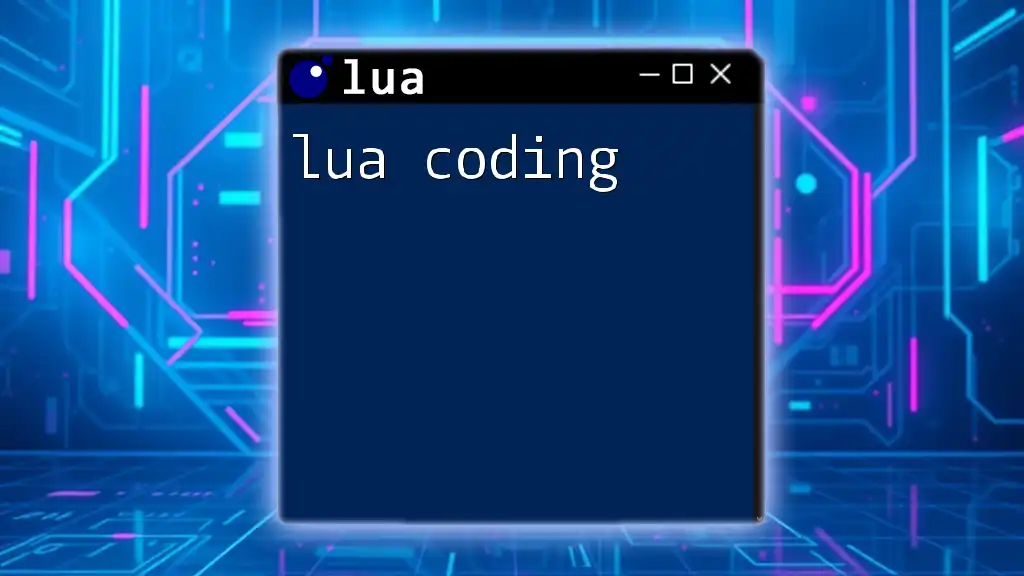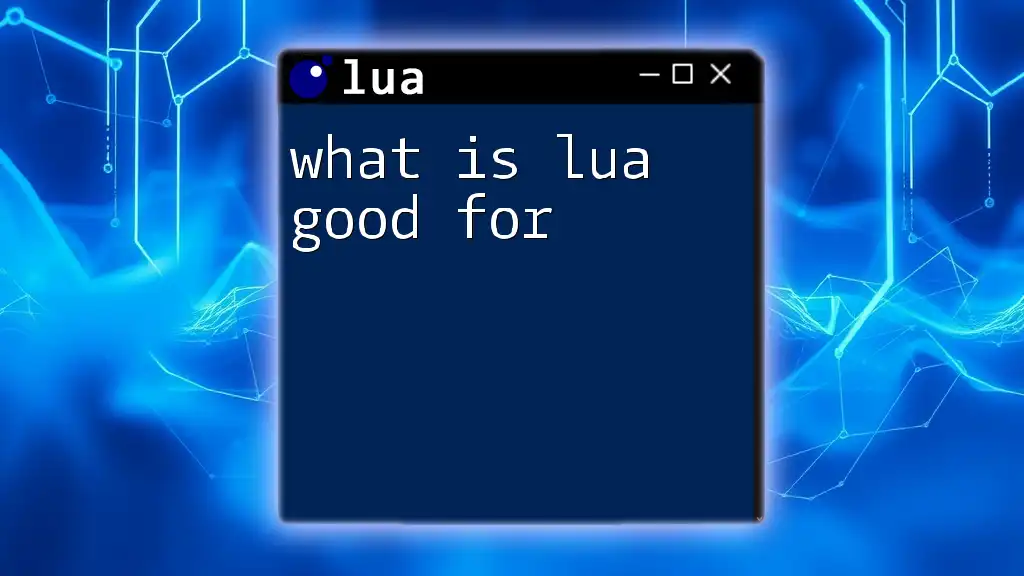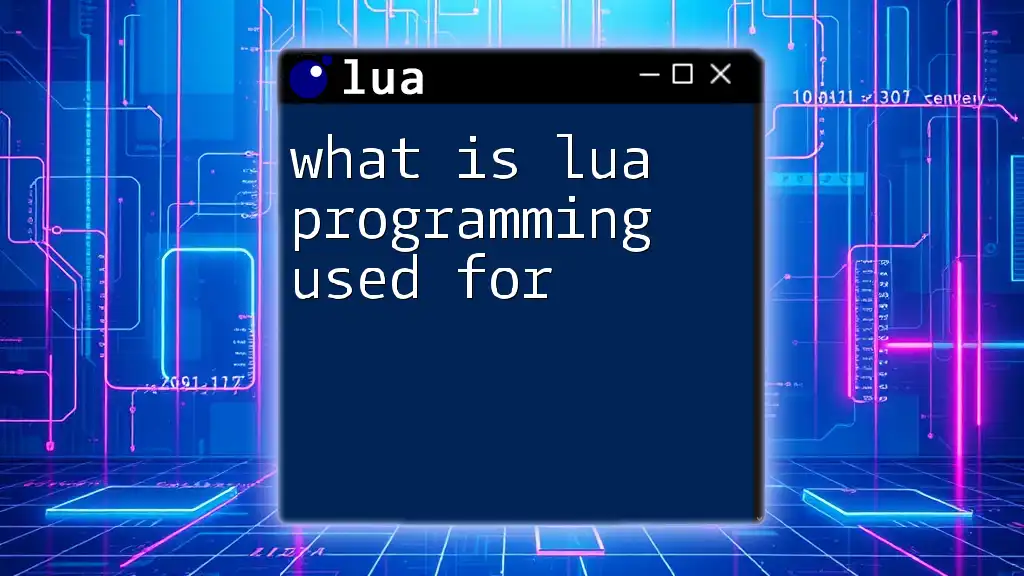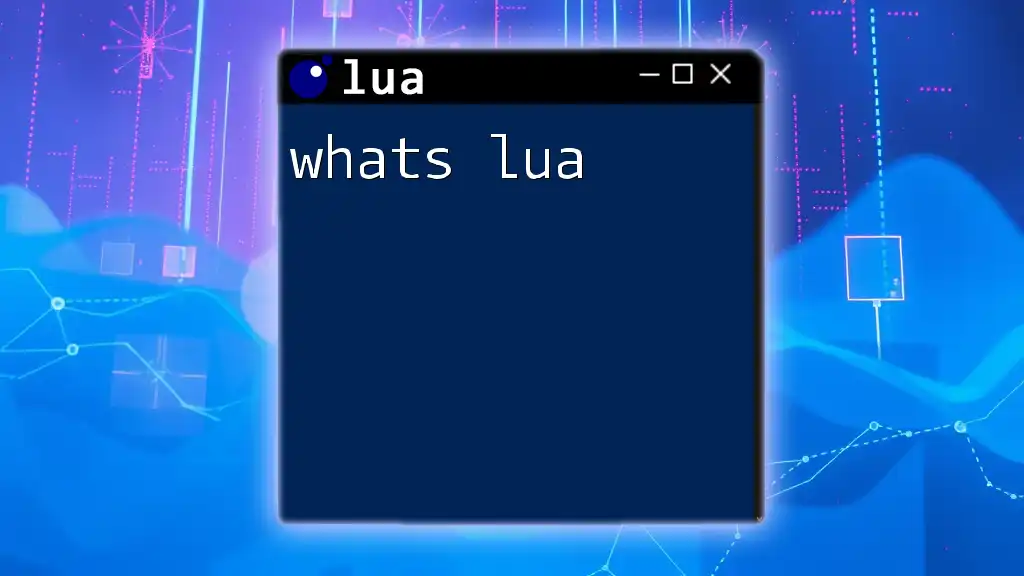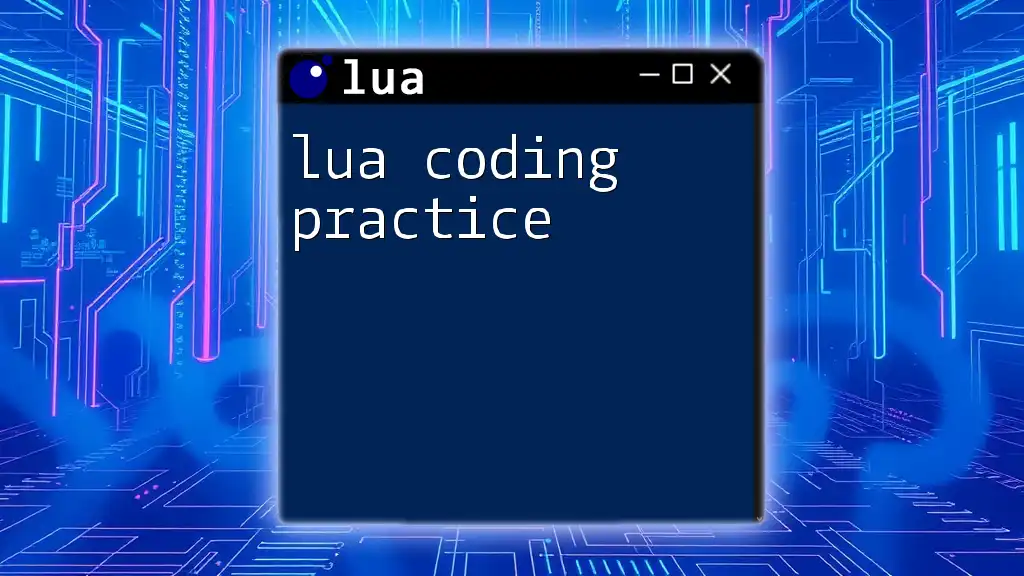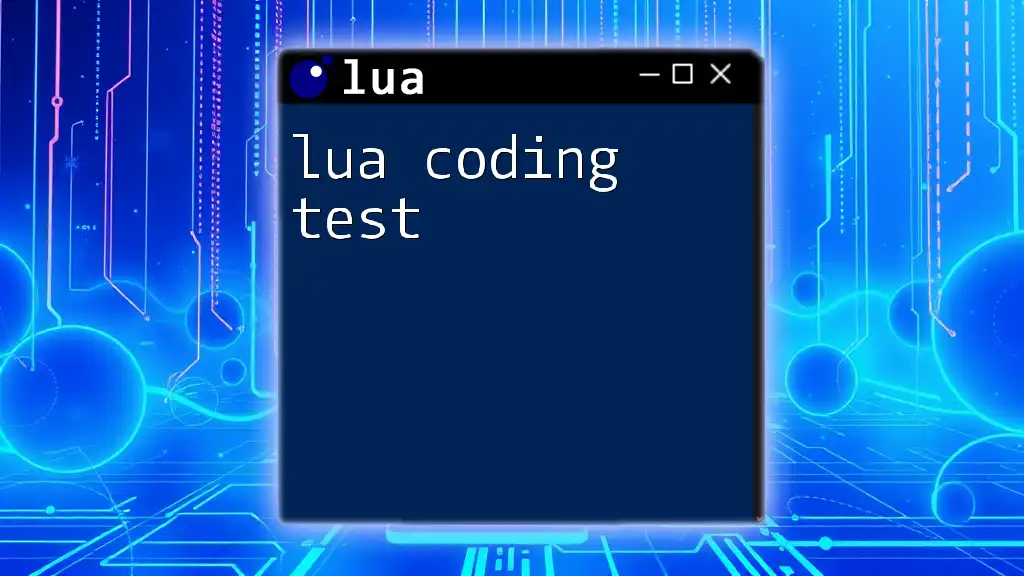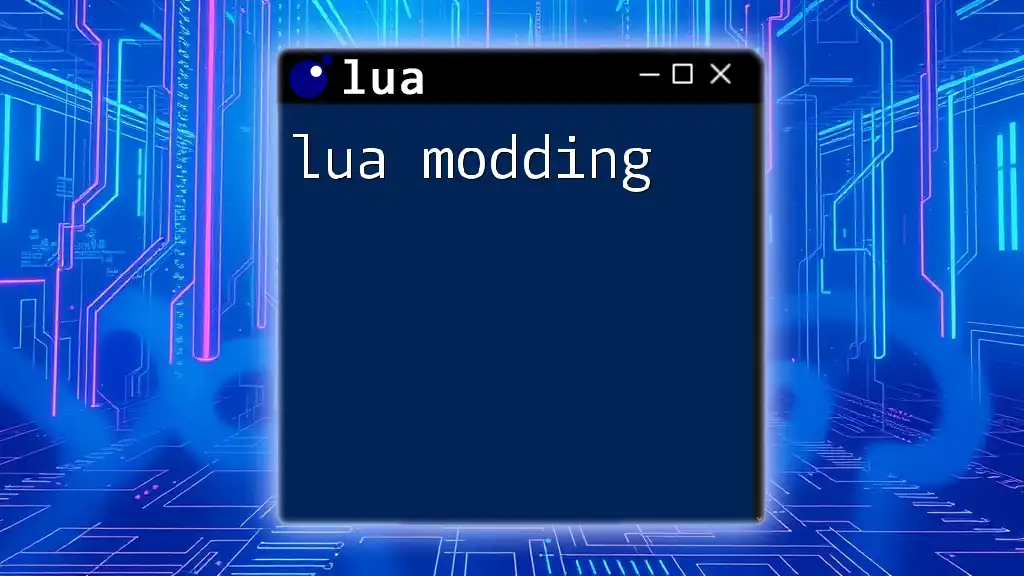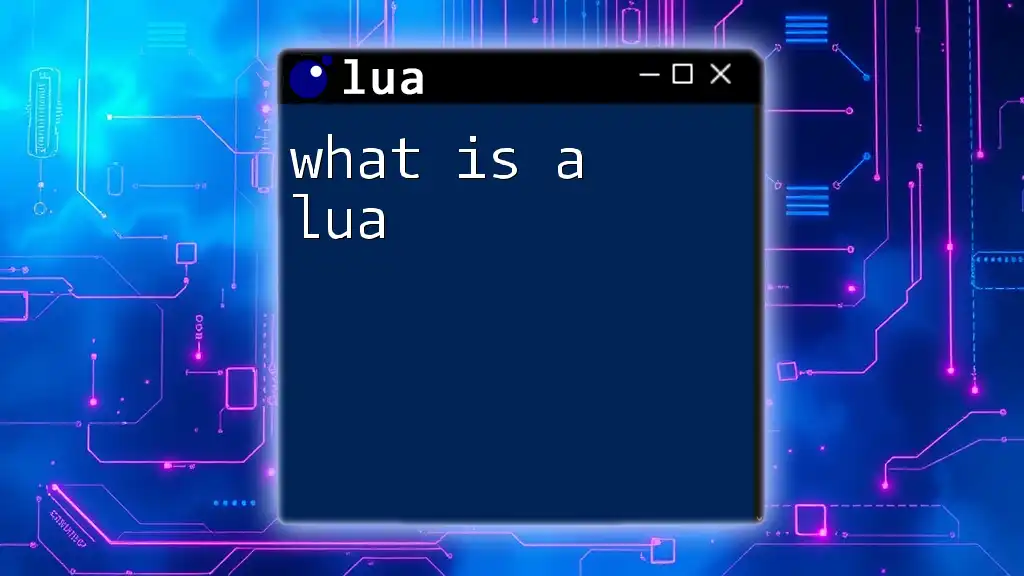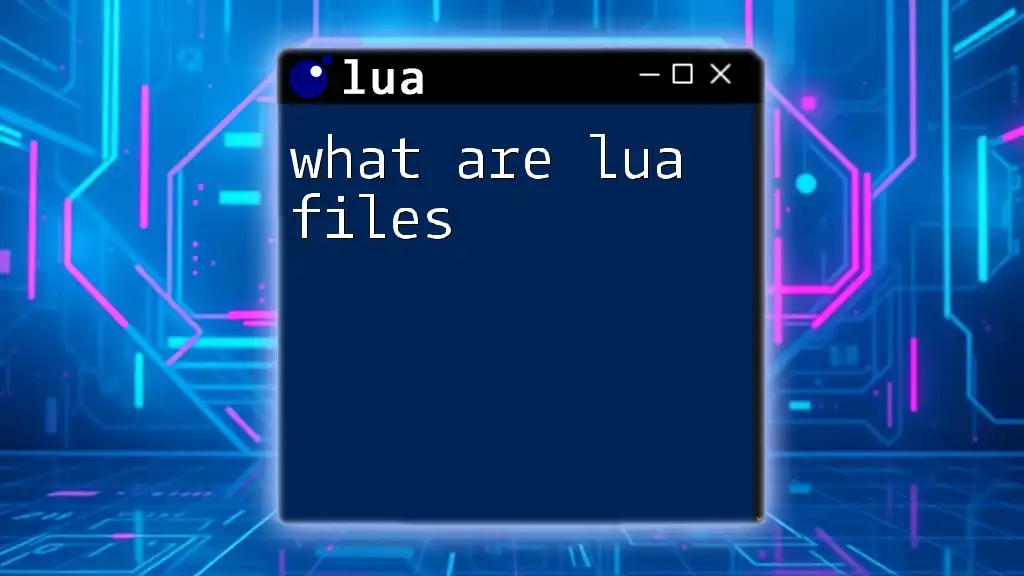Lua is a lightweight, high-level programming language designed for embedding in applications, known for its simple syntax and flexibility.
Here’s a basic Lua code snippet that demonstrates a simple function to add two numbers:
function addNumbers(a, b)
return a + b
end
-- Example usage
print(addNumbers(5, 3)) -- Output: 8
What is Lua Coding?
Introduction to Lua
Lua is a powerful, efficient, lightweight scripting language that originated in Brazil in the early 1990s. Designed primarily for embedding in other applications, Lua is renowned for its simplicity, performance, and flexibility. It serves as an excellent choice for various applications ranging from game development to web programming.
The core philosophy of Lua emphasizes portability and ease of integration, allowing developers to sculpt dynamic and complex functionalities through its lightweight structure.
Applications of Lua
Lua’s versatility makes it an excellent fit for many applications:
-
Gaming: Lua is widely used across the gaming industry, known for its embedding in popular titles like World of Warcraft and Angry Birds. It allows developers to script game mechanics smoothly, enhancing performance and flexibility.
-
Embedded Systems: Its lightweight architecture makes Lua ideal for use in embedded systems where resources are constrained.
-
Web Development: Frameworks such as Lapis utilize Lua for building scalable web applications with efficient performance.
-
Scripting in Applications: Numerous applications, including graphic design software like Photoshop, utilize Lua for customizable scripting capabilities, empowering users with more control.
Key Features of Lua
Lightweight and Fast
Lua is designed for speed and efficiency. Its simple syntax and execution model lead to faster performance, which is particularly beneficial when handling game logic or embedded scripting. This efficiency can be showcased with a simple timing example:
local start = os.clock()
for i = 1, 1000000 do end
print("Time taken: ", os.clock() - start)
Easy to Learn
The simplicity of Lua’s syntax promotes quick learning. Even beginners can easily grasp the essential concepts and start developing. A classic “Hello, World!” can be written as:
print("Hello, World!")
Flexible and Extensible
Lua's design allows it to interface smoothly with C and other languages, making it easily extendable for specific needs. Developers can use Lua to script application behavior while still relying on the performance of compiled languages for core functionalities.
Multi-Paradigm Support
Lua supports multiple programming paradigms, including:
-
Procedural: Writing algorithms in a step-by-step manner.
function greet(name) print("Hello, " .. name) end greet("Alice") -
Object-Oriented: Using tables and metatables to create object-oriented structures.
-
Functional: Treating functions as first-class citizens, allowing for higher-order functions.
Lua Syntax Essentials
Variables and Data Types
Understanding variable types is fundamental to using Lua effectively. Lua supports several data types:
- Number: Represents numerical values.
- String: Represents sequences of characters.
- Boolean: Represents true or false values.
- Table: A powerful associative array used to construct complex data structures.
- Function: Represents callable code blocks.
Example declaration and usage of different types:
local a = 10 -- Number
local b = "Lua" -- String
local c = true -- Boolean
local d = {1, 2, 3} -- Table
Control Structures
Control structures are essential for defining the flow of execution in Lua programs.
Conditions (if, else, elseif) help define branching paths:
if a > 5 then
print("a is greater than 5")
else
print("a is 5 or less")
end
Looping structures (for, while, repeat) allow for repeated execution of code blocks:
for i = 1, 5 do
print(i)
end
Functions
Functions are fundamental building blocks in Lua, enabling code reuse and organization. A simple function can be defined as follows:
function add(x, y)
return x + y
end
print(add(2, 3)) -- Outputs: 5
Functions in Lua can accept multiple arguments and return multiple values, making them highly flexible.
Tables: The Heart of Lua
Tables are perhaps the most significant data structuring feature in Lua. They are used to create arrays, dictionaries, and even objects.
What Are Tables?
Tables in Lua function as associative arrays, allowing developers to define relationships between keys and values. Essentially, everything in Lua (except for nil) is represented as a table.
Creating and Manipulating Tables
Creating and accessing tables is straightforward. Here’s an example:
local person = {name = "John", age = 30}
print(person.name) -- Outputs: John
person.age = 31 -- Modify age
Developers can traverse tables using loops or manipulate them with built-in functions for sorting and filtering.
Table Methods and Metatables
Lua provides a set of methods to manipulate tables effectively. For example, the `table.sort` function can organize elements in a table.
Metatables enable advanced operations such as operator overloading and customizing behavior when tables are accessed.
Lua in Action: Practical Applications
Scripting in Video Games
In game development, Lua is often used to script game behavior. For instance, a simple event handler in a game might look like:
function onPlayerJump(player)
print(player.name .. " jumped!")
end
This functionality can enhance the game environment, providing a rich, interactive experience.
Web Development
Lua also shines in web development frameworks like Lapis. A basic server script might be:
local lapis = require("lapis")
local app = lapis.Application()
function app:index()
return "Hello, World from Lapis!"
end
return app
Such frameworks leverage Lua’s speed and efficiency, enabling developers to handle high-traffic applications smoothly.
Getting Started with Lua
Setting Up the Environment
To begin coding in Lua, you'll need to install it on your device. Availability spans across major operating systems like Windows, macOS, and Linux. For installation instructions, refer to the [official Lua website](https://www.lua.org/download.html).
Tips for Learning Lua
When embarking on your Lua journey:
- Practice Regularly: Practical coding leads to better understanding.
- Leverage Resources: Utilize online courses, books, and tutorials.
- Engage with the Community: Participate in forums and discussions for shared knowledge and insights.
Conclusion
Lua coding is a pathway to creating efficient and powerful applications, whether in gaming, web development, or embedded systems. By embracing its features and simplicity, developers can unlock a realm of possibilities and create dynamic, robust scripts. Engaging actively with coding practices will lead to mastery in Lua, paving the way for innovative projects and solutions.
Further Reading and Resources
For those looking to delve deeper into Lua, several resources are available:
- Recommended Books: Explore titles that cover Lua from beginner to advanced levels.
- Online Course Platforms: Websites like Coursera and Udemy offer structured learning paths.
- Lua Community and Forums: Engaging with communities like Stack Overflow or the Lua mailing list can provide support and answer questions as you learn.
With determination and the right resources, you can become a proficient Lua developer and harness the full potential of this remarkable language.







